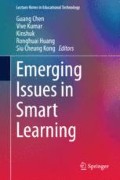Abstract
This paper discusses the development and validation of the smart classroom scale (SCS). The SCS is derived from existing technology integration learning environment instruments, including TROFLEI, TICI and CCEI. To accurately describe the smart classroom, the scales of flexibility use of smart classroom, learning data, and learning experience are added to SCS. More than three hundred 11 to 15 years old learners were invited to validate the instrument. Result of the study indicated that there are ten scales of the SCS: Spatial design, Flexibility use of smart classroom, Technology usage, Learning data, Differentiation, Investigation, Cooperation, Learners cohesiveness, Equity, and Learning experience. The Cronbach’s alpha reliability of the SCS instrument is 0.902. This shows that SCS is a parsimonious instrument for assessing the technology-rich smart classroom.
Access this chapter
Tax calculation will be finalised at checkout
Purchases are for personal use only
Preview
Unable to display preview. Download preview PDF.
References
Fraser, B. J.: Research on classroom and school climate. In D.L. Gabel (Ed.), Handbook of research on science teaching and learning. Macmillan, New York (1994).
Lizzion, Wilson, Simons.: University Students’ Perceptions of the Learning Environment and Academic Outcomes: implications for theory and practice. Studies in Higher Education. , 27-51(2002).
Aldridge, J. M., Dorman, J.P., Fraser, B.J.: Use of Multitrait-Multimethod Modelling to Validate Actual and Preferred Forms of theTechnology-Rich Outcomes-Focused Learning Environment Inventory (Troflei). Australian Journal of Educational & Developmental Psychology. 4, 110-125(2004).
Wu, Chang, Guo.: The Development of an Instrument for a Technology-integrated Science Learning Environment. International Journal of Science & Mathematics Education. 7, 207- (2009).
Newhouse, C. P.: Teachers’ responses and classroom learning environments associated with student access to portable computers. Unpublished doctoral thesis, Curtin University of Technology, Perth, Australia (1998).
Zandvliet, D.B.: The physical and psychosocial environment associated with classrooms using new information technologies-A cross-national study. Unpublished doctoral thesis, Curtin University of Technology, Perth, Australia (1999).
Hwang, G.-J., Chu, H.-C., Shih, J.-L., Huang, S.-H., & Tsai, C.-C.: A Decision-Tree- Oriented Guidance Mechanism for Conducting Nature Science Observation Activities in a Context-Aware Ubiquitous Learning Environment. Educational Technology & Society. 13 (2), 53-64 (2010).
Stephen S. Yau, Sandeep K. S. Gupta, Fariaz Karim, Sheikh I. Ahamed, Yu Wang, and Bin Wang.: Smart Classroom: Enhancing Collaborative Learning Using Pervasive Computing Technology. 2003 ASEE Annual Conference and Exposition: Staying in Tune with Engineering Education. 13633-13642 (2003).
Li, B., & Kong, S.C.: Technology intelligence of the smart learning environment: A content analysis of publications in the past decade. In W. Chen, X. Gu & Y.-T. Wu (Eds.), Proceedings of the 18th Global Chinese Conference on Computers in Education. Chungli, Taiwan: Global Chinese Society for Computers in Education. 232-233 (2014).
Trickett, E. J., & Moos, R. H.: Social environment of junior high and high school classrooms. Journal of Educational Psychology, 65(1), 93-102(1973).
Author information
Authors and Affiliations
Corresponding author
Editor information
Editors and Affiliations
Rights and permissions
Copyright information
© 2015 Springer-Verlag Berlin Heidelberg
About this paper
Cite this paper
Li, B.P., Kong, S.C., Chen, G. (2015). A Study on the Development of the Smart Classroom Scale. In: Chen, G., Kumar, V., Kinshuk, ., Huang, R., Kong, S. (eds) Emerging Issues in Smart Learning. Lecture Notes in Educational Technology. Springer, Berlin, Heidelberg. https://doi.org/10.1007/978-3-662-44188-6_6
Download citation
DOI: https://doi.org/10.1007/978-3-662-44188-6_6
Published:
Publisher Name: Springer, Berlin, Heidelberg
Print ISBN: 978-3-662-44187-9
Online ISBN: 978-3-662-44188-6
eBook Packages: Humanities, Social Sciences and LawSocial Sciences (R0)

